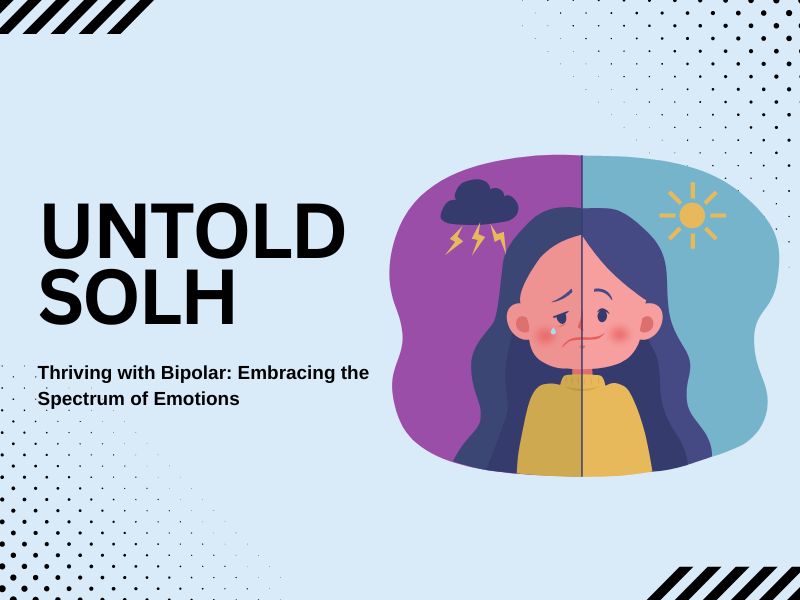World Bipolar Disorder Day is celebrated annually on March 30th to raise awareness and reduce the stigma surrounding bipolar disorder. The day also aims to promote education and understanding of this complex mental health condition affecting millions worldwide. This day is celebrated on the birth date of renowned artist Vincent Van Gogh who also suffered from the same disorder.
Common Stigmas around Bipolar Disorder
The stigma around bipolar disorder people often paints them as incapable of functioning in society, aggressive, and violent. However, effective treatment can allow individuals to have the ability to manage bipolar disorder to lead fulfilling lives, maintain relationships, and hold down jobs. While manic episodes can lead to agitation and impulsive behavior, people with bipolar disorder are more likely to hurt themselves than others. Unfortunately, those with bipolar disorder often face teasing, bullying, and unfair treatment that can restrict their social opportunities.
Why does Stigma around Bipolar Disorder exist?
The stigma surrounding mental illness often stems from a lack of understanding and awareness. Inaccurate media depictions of mental illness, such as exaggeration or sensationalized bipolar disorder, contribute to negative stereotypes and can make people with mental health conditions feel marginalized and ignored.
- Mental illness is often poorly understood, and this lack of understanding can lead to fear and discrimination toward those with mental health conditions.
- Stereotypes and misinformation surrounding mental illness are pervasive in society and are perpetuated through media, social norms, and cultural beliefs.
- People with mental health conditions often face stigma and discrimination, leading to a fear of being judged, ostracized, or mistreated. This fear can lead individuals to conceal their mental health struggles.
How to reduce stigma around Bipolar Disorder
The stigma around bipolar disorder can be reduced through education, language adjustments, and shared experiences. While completely eradicating stigma may not be possible, specific measures can help reduce its impact. Here are some tips and tricks for reducing the stigma surrounding mental health conditions:
- Educate yourself and others about mental health conditions to promote understanding and empathy.
- Share stories of lived experiences to help others better understand the challenges those with mental health conditions face.
- Use person-first language to avoid identifying individuals solely by their mental illness and promote empathy and understanding.
- Challenge stereotypes and misinformation surrounding mental health conditions.
- Encourage help-seeking behaviors by highlighting successful treatment and resources available for those with mental health conditions.
Coping from the stigma around your Mental Health
No treatment can fix this problem permanently. But reducing stress and taking care of oneself are essential ways to manage bipolar disorder. Seeking help from a therapist, practicing mindfulness techniques and coping skills, and calming the nervous system through breathing and yoga can help manage stress.
Here are some tips and tricks that can help you cope with this mental disorder:
- Stress management is crucial for people with bipolar disorder, and seeking professional help from a therapist, learning mindfulness techniques, and practicing coping skills can all be effective ways to manage stress.
- Prioritizing self-care by eating healthy, exercising, maintaining a consistent routine, and ensuring adequate sleep can help individuals with bipolar disorder.
- Journaling is a valuable tool for tracking mood changes, identifying triggers, and monitoring medication effectiveness. It can also be helpful to write positive affirmations on good days and read on challenging days.
- Support groups and groups with shared interests can provide a sense of belonging and understanding, which can help reduce feelings of isolation and improve mental health.
- Engaging in hobbies or interests can provide a sense of purpose and fulfillment outside of bipolar disorder. Many resources are available online for finding new hobbies or classes to develop skills and interests.
Conclusion
World Bipolar Disorder Day symbolizes hope for the people suffering from this disorder that they are not alone in this battle. By practicing helping each other and working on removing the stigma around bipolar disorder, we can make the life of people who are suffering from it a little easier.
Suppose you are someone (or know someone) suffering from this disorder and want a way out, then connect with Solh Wellness. We provide a safe space for individuals suffering from mental health issues to help them overcome challenges in their life. Download the Solh Wellness App and take a step towards your better mental health & better life.



